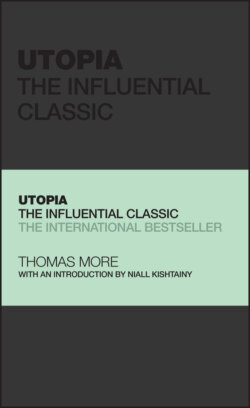Читать книгу Utopia - Sir Thomas More, Thomas More, William Roper - Страница 8
THE WRITING OF UTOPIA
ОглавлениеIn 1515, More was sent to Bruges as part of a diplomatic mission charged with settling a trade dispute between England and Flanders. During a lull in the talks, More visited Antwerp where he stayed with the town clerk, Peter Giles, with whom he developed a close friendship. Antwerp was then Europe's leading commercial city, and Giles one of its prominent officials and a highly learned man. The time in Antwerp had a stimulating effect on More. While at leisure there he conceived and began to write Utopia.
There appears, therefore, to have been an element of serendipity in the composition of Utopia, but in fact the ideas in it had been brewing in More's mind for years. By the time of the Bruges mission, More was a busy lawyer, and was Undersheriff of London. He had become a Member of Parliament and had negotiated on behalf of the Mercers' trading company, which represented wool and cloth merchants. These activities would have made More well aware of the social problems facing Tudor England as its commercial economy grew and traditional ways of life were displaced.
Steeped in theological and classical learning, More had become one of the most brilliant scholars of his day. When a young man, he had caught the attention of England's men of letters by delivering a series of lectures on The City of God, the vast work written at the end of the Roman Empire by the early Christian father, St Augustine of Hippo. Augustine's central idea was that of two cities that exist within human society: the worldly city of temporal desire and sin and the godly city of peace and fulfilment. Augustine was a major influence on More's spiritual development, and the idea of the two cities applied to social questions most likely fuelled the thinking that went into Utopia. A few years earlier, More had begun writing A History of Richard III, an account of the king whose defeat by Henry Tudor at Bosworth Field ushered in the Tudor reign. Richard's notoriety came in part from More's unflattering portrait of him in this work. Through Richard's story, the book deals with questions of tyranny and of sound kingship.
Utopia, then, was written by a man of considerable intellectual and practical credentials. More knew the law inside out, moved in the highest scholarly and court circles, and in his early works had already begun thinking about the pressing social and political problems of the day. Authors of the utopian tracts of the eighteenth and nineteenth centuries aimed their works at a wide audience, hoping that their ideas would be adopted in practical programmes of reform. Utopia's sixteenth‐century audience was much narrower: the book was written for the elite Latin‐speaking scholars of Europe rather than the bakers and butchers of More's daily life in London.
